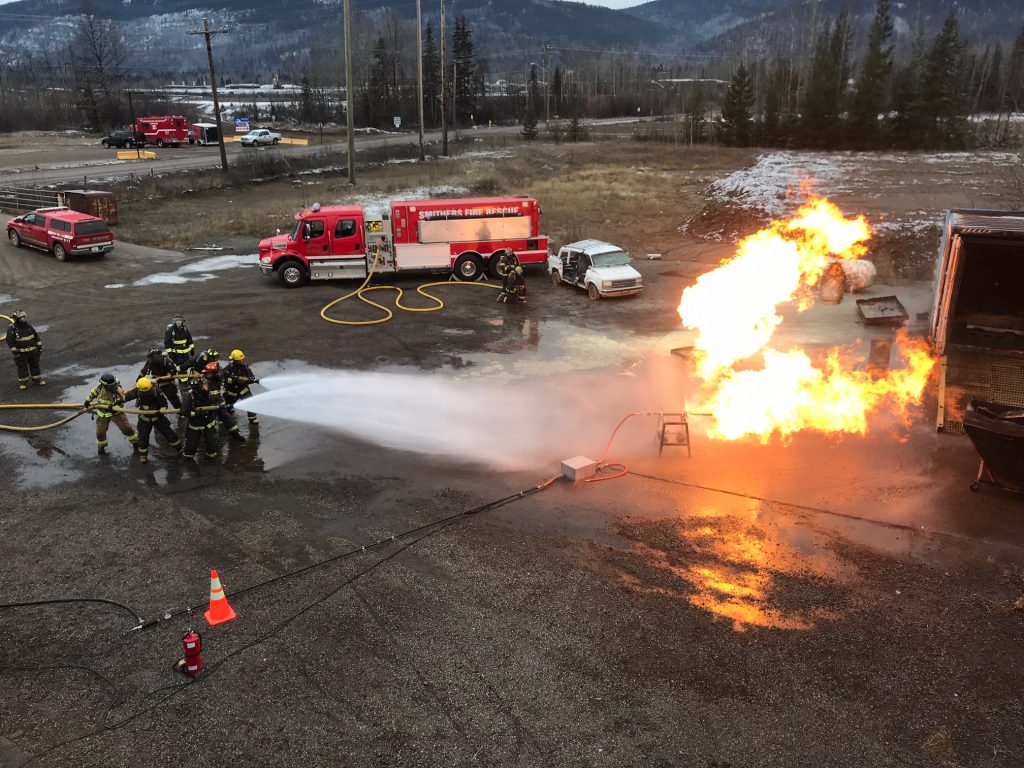
ERAC’s LPG Firefighting Awareness training has been revitalized, now online and free
By Danelle Wettstein
Industry News News Photo credit: ERAC
Photo credit: ERAC Feb. 17, 2021, Calgary — These days, training can be a struggle. Public health orders are constantly changing. Now in its 35th year of operations, Emergency Response Assistance Canada (ERAC) continues to deliver training and assist firefighters, specifically in those situations where risk is significant and firefighter safety is paramount. Encountering liquefied petroleum gas (LPG) incidents, whether by road, rail or stationary tank, requires a thorough understanding of risk versus reward of actions taken at an emergency.
Earlier this year, ERAC launched its revitalized LPG Firefighting Awareness training – in English and French – online and free to all first responders. It provides firefighters with the ability to make safe and strategic decisions of non-intervention, offensive and defensive strategies when encountering LPG fire emergencies, and information needed to assess hazards and prevent further harm or injury at the scene. With this knowledge, our first responders can reduce the risk to their communities and themselves.
Over 2,200 first responders have taken the original course, more than one fire department in Canada has linked this course in their learning management system as part of their training, and ERAC’s LPG fire fighting courses are endorsed by the Ontario Association of Fire Chiefs.
After the online course, the next step for fire departments is to enroll in LPG Level 1 Firefighting, providing municipal firefighters with additional information, hands-on training and scenario testing.
“The LPG Level 1 Mobile Operations Training has provided our members the knowledge and experience of dealing with LPG,” said Matthew Roy, fire chief for the Township of North Glengarry, Ont. “The training was an absolute success.”
The course is unique in that training can be conducted at the location of your fire service or mutual aid district, eliminating travel and keeping training to cohorts. Sponsoring organizations of these training events include AltaGas, CanGas Propane, Capital Propane, CN, Dowler-Karn, P38 Energy, Pembina Pipeline Corporation and Superior Propane.
“Our two-day LPG Level 1 Firefighting training session with ERAC was fantastic,” said Jeff Beckwith, deputy fire chief for Prince Rupert Fire Rescue, B.C. “When I was walking around the site, I was listening to the crews pre-planning strategies, discussing angles of approach and nozzle patterns, and this says to me that they are very much engaged in the training and excited to talk about how to tackle the fires between themselves. These problem-solving scenarios develop buy-in and team building skills for my members.”
This training for first responders is part of ERAC’s four pillars of service. The other three pillars include:
- ERAC Responder Training: ERAC trains, assesses and approves its response teams, remedial measures advisors (RMAs), technical advisors (TAs) and home base coordinators. ERAC training is state-of-the-art and reflects the highest industry standards while adhering to NFPA, and to regulatory guidelines and mandates across Canada.
- Dangerous Goods Emergency Response: ERAC’s emergency call centre is available 24/7 to effectively manage responses when contacted by a first responder, shipper or agency. When necessary, ERAC will have a TA or RMA on scene to assess, advise and communicate with the incident commander within three hours on average and a response team dispatched and on scene within about six hours.
- Dangerous Goods Emergency Response Planning: ERAC creates emergency response plans, and reviews and validates existing plans, including organizing tabletop and on-site exercises designed to test facility preparedness and regulatory compliance.
For more information, visit erac.org/FFTraining, or contact ERAC at training@erac.org or 250-318-5708.
Print this page
Advertisement
- Officials investigating suspicious fire at Montreal souvlaki restaurant
- London townhouse fire leaves one person dead